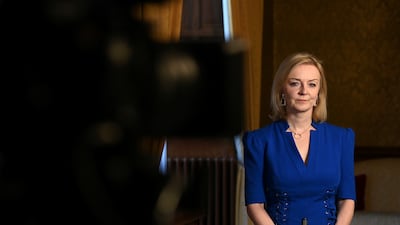Decades of “strategic drift” in the West must end with Britain using economics as a driving force for international influence, the foreign secretary has said.
Liz Truss on Wednesday set out a vision of a new era for British economic growth that will be at the heart of its foreign policy.
No longer part of the EU, the country will lead the world in new technologies and alliances, she declared in her first major speech in the new post.
Britain will become “unashamedly commercial”, hosting business delegations and striking deals on technology, trade and security, she said.
“The world is moving very fast and ideas are moving even faster,” she told a packed audience at the Chatham House think tank.
“The battle for economic influence is already in full flow.”
She also decried the wasted years of western introspection following the Cold War while other nations, notably China, surged ahead.
“There was strategic drift. Defence spending fell. Countries became strategically dependent on cheap gas or reliant on others for vital technology like 5G.”
The West’s “complacency” had been exploited by those “who never stopped fighting the global battle of ideas”, using cash for influence.
“It’s time to wake up,” she declared. “The free world’s age of introspection must end now. Instead, we need the age of ideas, influence and inspiration.”
Europe had to reverse its reliance on foreign energy, with Russia in particular supplying 40 per cent of all its gas.
“We have to end this strategic dependency. Whether it's on energy, investment or technology, we have to provide an alternative and that means stepping up our engagement and our investment.”
She also urged the West to be at the crest of the next technology wave of quantum computing, 6G and artificial intelligence.
After about 50 years in the EU, Britain has now become “unfrozen” post-Brexit and is uniquely equipped to “lead the charge” to formulate its own international policy without rowing in behind Brussels, she stated.
“It's a new opportunity for the UK to shape the international agenda,” said Ms Truss.
“As an outward-looking, sovereign nation, we're rebuilding our muscle to fulfil the promise of global Britain.”
While adversaries used economics and technology “as tools of control, we want to use them as tools of liberation”, she said. Therefore, Britain will reach out “to build new economic partnerships” by forging links with fellow technology powerhouses such as India, Indonesia and Israel.
Ms Truss promised to set out Britain's new approach to “tech leadership on the global stage” in the New Year, touching on potential deals with the US and Singapore.
She claimed that the opportunities, diversity and freedoms found in the UK attracted both foreign governments and firms.
“People want to do business with Britain. They trust us and they see things in Britain that they would like for their own countries,” she said.
“They know we're an economic powerhouse growing faster than any other G7 nation.”
With the UK spending more than any other European country on defence, it is able to build new alliances to protect friends and secure the high seas with new aircraft carriers.
She lauded the new Aukus defence agreement between the UK, US and Australia to defend sea routes in the Indo-Pacific and collaboration with Canada to cover the Artic region.
She also announced a new development strategy that would include a focus “on providing women and girls with the freedom they need to succeed”.
With hostile countries “using disinformation to undermine truth” and “extremists perpetuating malign ideologies through social media”, she urged the free world to fight back with economic power and technology to “promote freedom not fear".
The government’s apparent “war on woke” was unapologetically attacked, with Ms Truss condemning the hand-wringing over Britain’s colonial past.
“Our history, warts and all, makes us what we are today,” she argued. “It's time to dump the baggage, ditch the introspection and step forward, proud of who we are, what we stand for, ready to shape the world anew.”
She said people need to “stop fighting about the past” and instead “start fighting for the future”.


